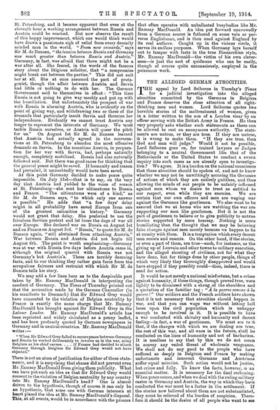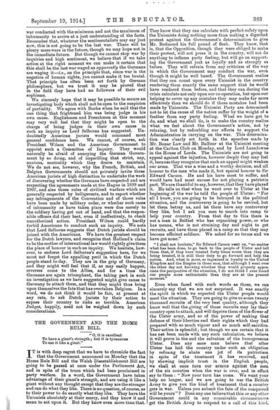THE ALLEGED GERMAN ATROCITIES. T HE appeal by Lord Selborne in
Tuesday's Times for a judicial investigation into the alleged atrocities committed by the Germans in Belgium and France deserves the close attention of all right- thinking men and women. Lord Selborne quotes two horrible stories of the maltreatment of women, given in a letter written to the son of a London vicar by an officer serving with the British Army in France. He then very properly asks whether such statements as these can be allowed to rest on anonymous authority. The state- ments are untrue, or they are true. If they are untrue, it is wrong to make them. "If they are true, then God and man will judge." Would it not be possible, Lord Selborne goes on, for trained lawyers or Judges belonging to a neutral Government like that of the Netherlands or the United States to conduct a sworn inquiry into such cases as are already open to investiga- tion ? We agree. It is a burden on the national conscience that these atrocities should be spoken of, and not to know whether we may not be unwittingly accusing the Germans of actions of which they are entirely guiltless, and thus allowing the minds of our people to be unfairly inflamed against men whom we desire to treat as entitled to our respect, even while they are enemies. We are certain that our own officers and men are waging war against the Germans like gentlemen. We also want to be assured that we at home who are watching the war are supporting our men like gentlemen. But it is not the part of gentlemen to believe or to give publicity to untrue stories supported by mere hearsay. Nothing is more humiliating than the thought that we may be believing false charges against men merely because we happen to be at enmity with them. It is a temptation which every decent man resists and resents. On the other hand, if the stories, or even a part of them, are true—such, for instance, as the giving up of Louvain and other towns to military execution, and the alleged shooting of civilians, not for what they have done, but for things done by other people, things of which very likely they thoroughly disapproved and would have stopped if they possibly could—then, indeed, there is need for action.
It would be not merely a national misfortune, but a crime against humanity, if these things, though proved true, were lightly to be dismissed with a shrug of the shoulders and a quotation of the familiar tag : "A la guerre comme a N guerre I " Our soldiers and the French soldiers have shown that it is not necessary that atrocities should happen in war, and that you can wage war without letting bell loose upon the civil population which is unhappy enough to be involved in it. It is possible to have a war conducted with chivalry and humanity and decent feeling—in fact, a war of gentlemen. We must see to it that, if the charges with which we are dealing are true, the rest of this war, and all wars in the future, shall be conducted on the lines of humanity and not of barbarism. It is needless to say that by this we do not mean to convey any veiled threat of wholesale vengeance. We shall not do any good to the people who have suffered so deeply in Belgium and France by making unfortunate and innocent Germans and Austrians suffer equal miseries. Such action would not be justice, but crime and folly. To know the facts, however, is an essential matter. It is necessary for the final reckoning. When peace comes, and when we deal with the ruling military castes in Germany and Austria, the way in which they have conducted the war must be a factor in the settlement-. If the stories now believed about them are not substantiated, they must be relieved of the burden of suspicion. There- fore it should be the desire of all people who want to see
war conducted with the minimum and not the maximum of inhumanity to arrive at a just understanding of the facts. Remember that, whatever the sentimentalists may say just now, this is not going to be the last war. There will be plenty more wars in the future, though we may hope not in the immediate future. But though we cannot stop war by inquiries and high sentiment, we believe that if we take action at the right moment we can make it certain that this shall be the last war waged as apparently the Germans are waging it—i.e., on the principle that, since war is the negation of human rights, you cannot make it too brutal. That principle has often been set forth by German philosophers, but we trust it may be proved that in the field they have had no followers of their evil sophisms. We sincerely hope that it may be possible to secure an investigating body which shall not be open to the suspicion of partiality. We agree with Burke when he said that the one thing that frightened him was being judge in his own cause. Englishmen and Frenchmen at this moment may very well feel that they might be open to the charge of being judges in their own cause in such an inquiry as Lord Selborne has suggested. Un- doubtedly American jurists would command most general confidence here. We cannot, of course, ask President Wilson and the American Government to appoint such a Committee of Inquiry. They would naturally be afraid of annoying the German Govern- ment by so doing, and of imperilling that strict, nay, anxious, neutrality which they desire to maintain. We do not see, however, why the French, British, and Belgian Governments should not privately invite three American jurists of high distinction to undertake the work of discovering whether the Germans have respected and are respecting the agreements made at the Hague in 1899 and 1907, and also those rules of civilized warfare which are generally respected by belligerents, and to report whether any infringements of the Convention and of those rules have been made by military order, or whether such cases of inhumanity as have taken place were due merely to the soldiery having got out of hand, and that the respon- sible officers did their best, even if ineffectively, to check unauthorized action. President Wilson could hardly forbid Americans to conduct such an inquiry. We note that Lord Selborne suggests that Dutch jurists should be joined with the Americans. We have the greatest respect for the Dutch lawyers, and recognize that Holland's claim to be the mother of international law would rightly give them the place of honour in such an inquiry. We hesitate, how- ever, to endorse Lord Selborne's suggestion here, for we must not forget the appalling peril in which the Dutch people stand to-day. They are in the grip of Germany, and they might well feel that if, as may easily happen, reverses come to the Allies, and for a time the Germans are again triumphant, the taking part in such an investigation as we have suggested might give cause to Germany to attack them, and that they might thus bring upon themselves the fate that has overtaken Belgium. In a word, we do not think it would be fair, at present at any rate, to ask Dutch jurists by their action to expose their country to risks so terrible. American Judges, happily, need not be weighed down by such considerations.



































 Previous page
Previous page